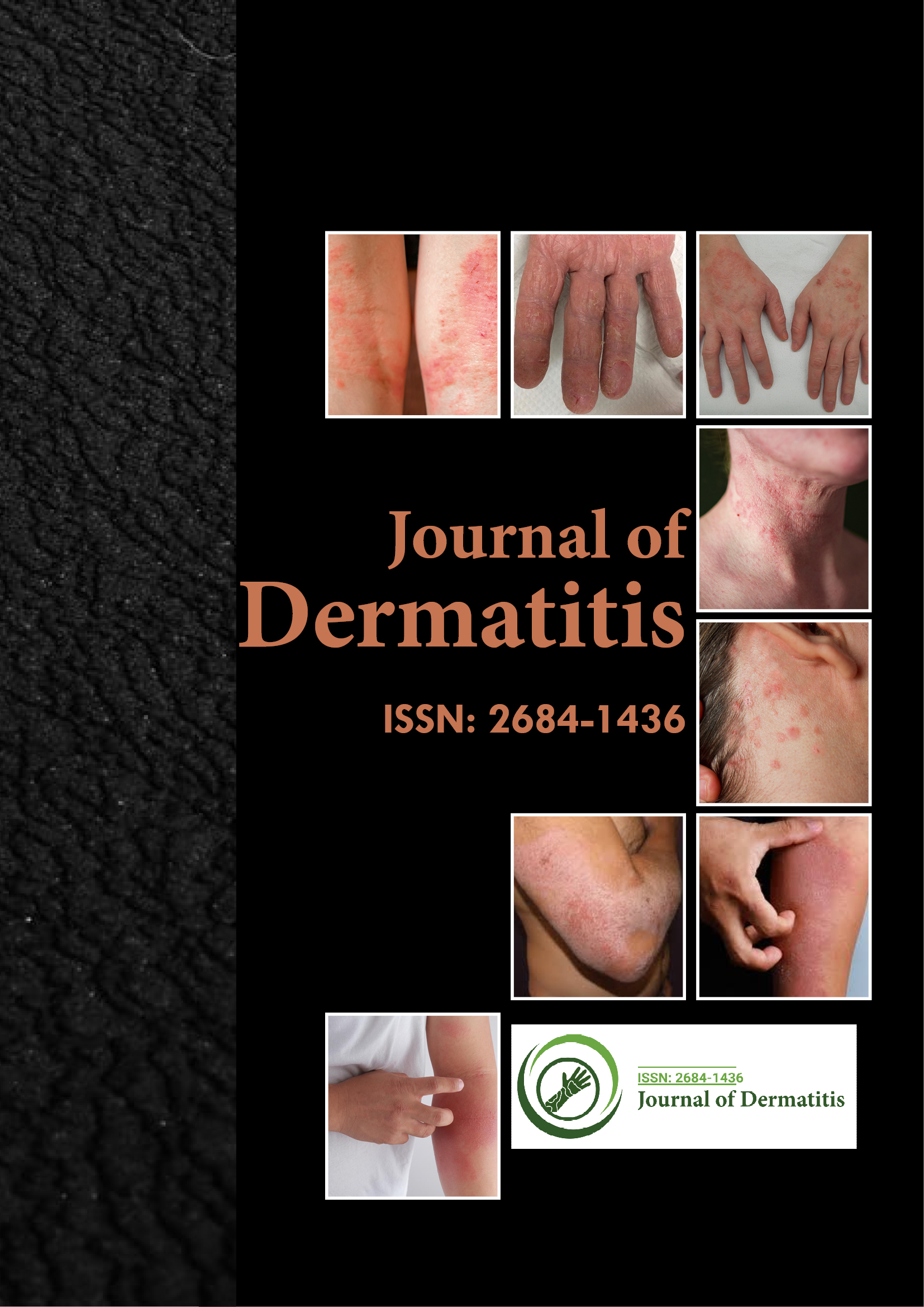Indexed In
- RefSeek
- Hamdard University
- EBSCO A-Z
- Euro Pub
- Google Scholar
Useful Links
Share This Page
Journal Flyer

Open Access Journals
- Agri and Aquaculture
- Biochemistry
- Bioinformatics & Systems Biology
- Business & Management
- Chemistry
- Clinical Sciences
- Engineering
- Food & Nutrition
- General Science
- Genetics & Molecular Biology
- Immunology & Microbiology
- Medical Sciences
- Neuroscience & Psychology
- Nursing & Health Care
- Pharmaceutical Sciences
Perspective - (2022) Volume 7, Issue 2
Note on Complications of Neurodermatitis
Kathie Huang*Received: 01-Mar-2022, Manuscript No. JOD-22-16437; Editor assigned: 04-Mar-2022, Pre QC No. JOD-22-16437 (PQ); Reviewed: 17-Mar-2022, QC No. JOD-22-16437; Revised: 24-Mar-2022, Manuscript No. JOD-22-16437 (R); Published: 31-Mar-2022, DOI: 10.35248/2684.1436.22.7.148
Description
Neurodermatitis is a skin condition that starts with an itchy spot of skin. Scratching makes it indeed itchier. This itch- scratch cycle causes the affected skin to become thick and tough. You may develop several itchy spots, typically on the neck, wrists, forearms, legs or anal region.
Neurodermatitis also known as lichen simplex chronic-is not lifemenacing or contagious. But the itching can be so terrible or intermittent that it disrupts your sleep, sexual function and quality of life.
Breaking the itch- scrape cycle of neurodermatitis is laborious, and neuro dermatitis is generally a lifelong condition. Treatment success depends on defying the drive to rub or scratch the affected areas. Over-the-counter or tradition medicines may help ease the itching. You'll also need to identify and exclude factors that may be complicating the problem.
Symptoms
Signs and symptoms of neuro dermatitis include:
• An itchy skin patch or patches
• Tough or scaled texture on the affected areas
• A raised, rough patch or spots that is red or darker than the rest of your skin
The condition involves regions that can be reached for scratching the head, neck, wrists, forearms, ankles, vulva, scrotum or anus. The itchiness, which can be terrible, may come and go or be n"art-13"> you may scratch out of habit and while sleeping.
Causes
The cause of neuro dermatitis is unknown. The case rubbing and scratching that characterize the condition may begin with commodity that simply irritates the skin, similar as impermeable apparel or a bug bite. As you rub or scratch the area, it gets itchier. The more you scratch, the more it itches.
In some cases, neuro dermatitis is associated with habitual skin conditions analogous as dry skin, eczema or psoriasis. Stress and anxiety can drive itching too.
Trouble factors
Certain factors may affect your trouble of neuro dermatitis, including:
• Your coitus and age. Women are more likely to develop neuro dermatitis than are men. The condition is most common between periods 30 and 50.
• Other skin conditions. People with a individual or family history of dermatitis, eczema, psoriasis or similar skin conditions are more likely to develop neuro dermatitis.
• Anxiety diseases. Anxiety and stress can drive the itch of neuro dermatitis.
Complications
Patient scratching can lead to a crack, a bacterial skin infection, or endless scars and changes in skin color. The itch of neuro dermatitis can affect your sleep, sexual function and quality of life.
Opinion
Your doctor may diagnose neuro dermatitis by examining the affected skin and determining whether you've been itching and scratching. To rule out other causes, he or she may take a small sample of the affected skin (skin dissection) for testing.
•Anti-itch treated creams. However, your doctor may define a stronger corticosteroid or a nonsteroidal- itch product, if adverse corticosteroid cream isn't helping. A calcineurin asset (tacrolimus) ointment may help if the vulva is involved.
•Corticosteroid injections. Your doctor may fit corticosteroids directly into the affected skin to help it heal.
•Medicine to ease itching. Tradition antihistamines help relieve itching in further number of people with neuro dermatitis.
Some of these drugs may beget doziness and help with easing scratching while you sleep.
•Anti-anxiety drugs. Because anxiety and stress can driveanxiety drugs may help prevent the itchiness.
•Medicated patches. For stubborn itching, your croaker may suggest topical lidocaine 5 percent or capsaicin 8 percent patches.
•Light cure. Exposing the affected skin to particular types of light is sometimes helpful.
•Psychotherapy. Talking with a counsellor can help you learn how your passions and conduct can fuel or help itching and scratching.
Life and home remedies
These tone-care measures can help you manage neuro dermatitis
• Stop rubbing and scratching. The itching may be ferocious, but avoiding rubbing and scratching is vital to controlling your condition and preventing a rush.
• Apply cool, wet compresses. These may soothe the skin and relieve the itch. Putting a cool, wet compress on the affected skin for a multitudinous twinkle before you apply a treated cream helps the cream soak into the skin.
• Try untoward cures. Apply an anti-itch cream or cream to the affected area. A hydrocortisone cream can temporarily relieve the itch. An oral antihistamine, similar as diphenhydramine can relieve severe itching and help you sleep. Some people have success with capsaicin (kap-SAY-ih- sin) cream, but it may overcharge at first.
• Cover the affected area. Tapes or dressings can help cover the skin and help scratching. These may be especially useful if you scratch during your sleep.
• Keep your nails trimmed. Short nails may do minor damage to the skin, especially if you tend to scratch while you're asleep.
• Take short, warm cataracts and moisturize your skin. Prepare your bath with warm not hot water. Sprinkle in colloidal oatmeal. Use mild cleaners without coloring or scents. Limit bathing time and frequency.
• After washing, stroke your skin dry and apply unscented moisturizer.
• Avoid triggers. Notice what seems to bring on a rush and avoid it. For illustration, use stress regulation approaches and avoids vesture that irritates your skin.
Citation: Huang K (2022) Note on Complications of Neurodermatitis. J Dermatitis.7:148
Copyright: © 2022 Huang K. This is an open-access article distributed under the terms of the creative commons attribution license which permits unrestricted use, distribution and reproduction in any medium, provided the original author and source are credited.

